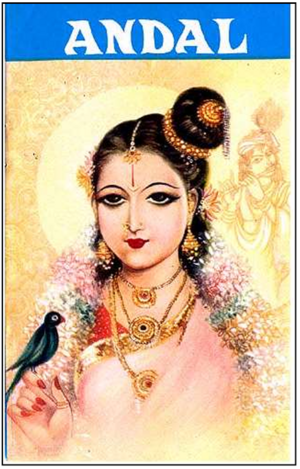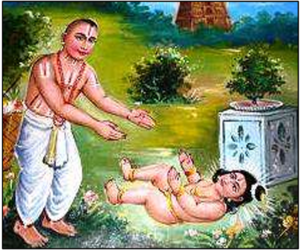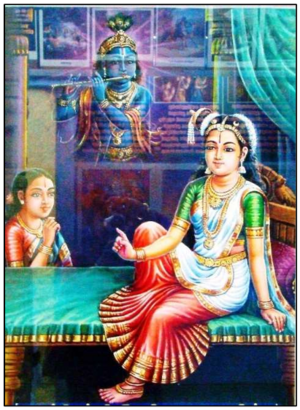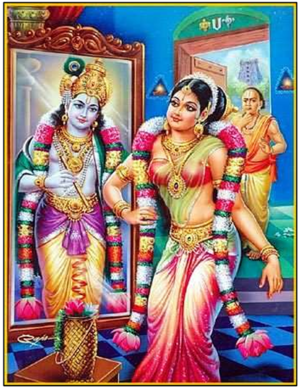Talk:Kānta Bhāva: Bhagavān as a Spouse
By Vishal Agarwal
Here, the Bhakta behaves as a spouse of Bhagavan. He develops a very trusting, loving, steady, and confident relationship. Bhakta-s typically perceive Bhagavan as a husband, but sometimes also as a wife.
Andal lived in the 8th century CE. Along with Nammalvar, she is considered the most important of the 12 Alvars. No one knows who her biological parents were. Shri Vishnuchitta, a pious Bhakta of Vishnu, found her one day in a bush of Tulsi plant (sacred to Vishnu) in his garden. He adopted the baby girl as his daughter and named her ‘Godai’ (‘gift of mother earth’). Vishnuchitta himself is regarded as one of the 12 Alvars and is known as ‘Periyalvar.’
Vishnuchitta lived in the city of Srivilliputtur, where he had the duty of delivering flower garlands to Vishnu’s temple every day. Andal grew up in holy surroundings, worshipping the Vishnu and listening to holy discourses, Vedas, Epics, Bhajans, Keertans, etc. From childhood onwards, she listened to the Leelas (pranks) of Krishna with rapt attention and developed a deep love for the Lord. By her virtuous behavior, Godai became a master of the hearts of her father and her friends, due to which her neighbors gave her the name ‘Andal’ (meaning ‘Ruler’).
When Godai grew up, she made these garlands and sent them to her beloved Lord through her father. She started wearing the flower garland, which was meant to be offered to the Lord secretly before sending it through her father. One day, she was caught red-handed by her father one day. Vishnuchitta went to the temple empty-handed that day and apologized to God for his daughter’s behavior.
But that night, he appeared to him in a dream and said, “Periyalvar, the garland worn by your daughter has the sweet fragrance of her devotion and purity; that is the garland I love." Vishnuchitta realized that Divine Love existed between the Lord and his daughter. Andal declared that she would marry none other than Krishna. As years went by, Andal became even more and more devoted to Vishnu. She imagined that Srivilliputhir was Gokul where Krishna had spent his childhood and that her friends were Gopis. One year, during the month of Margazhi (December-January), she kept a 30-day long vow. Each of these 30 days, she would deck herself as a bride, and sing a new song in praise of Vishnu.
Vishnu appeared in a dream to her father and said, “When the month of Margazhi is over, I want you to dress your daughter as bride and bring her to me in the temple.” Periyalvar did as he was commanded, and took her to the Vishnu Mandir in a wedding procession. When Andal reached the temple, she transformed into a pillar of light and merged with Bhagavān Vishnu.
Andal composed two works in her short life. Her first work is Tiruppavai, a poem of thirty verses in which Andal imagines herself to be a cowherd girl and sings hymns about Lord Krishna. The second is the Nacciyar Tirumoli, a poem of 143 verses.
Tirumoli, literally meaning "sacred sayings", is a Tamil poetic style in which the work is composed. Andal is now one of the best-loved poet-saints of the Hindus in south India. She is present in many Vaishnava temples, in India and elsewhere, next to her Lord, as she always desired. As she was regarded as a gift of Mother Earth, she is also referred to as an incarnation of ‘Bhoodevī’ (Mother Earth). During the month of Margazhi, discourses (religious explanations by scholars) on the Tiruppavai in Tamil, Telugu, Kannada, Hindi, and English are given place all over India. A temple at her birthplace was constructed at Srivilliputhir, where Hindus go in large numbers to worship.




